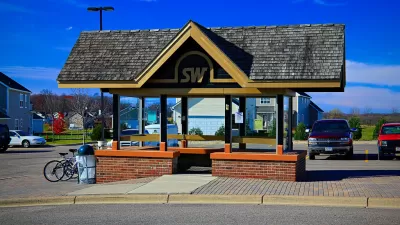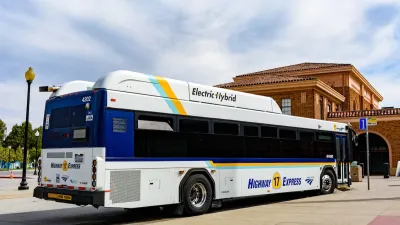At long last, after more than a thousand days of politicking, Congress passed a comprehensive federal transportation funding bill on Friday. Transportation reform advocates are disappointed by the results.
With the clock ticking on the expiration of the federal highway trust fund, and a tenth extension to the previous transportation bill looming, Congressional negotiators reached agreement on a long-term transportation bill for the first time in seven years. With a prime opportunity to reform the nation's transportation policy from the top down in response to the historically high usage of public transit nationwide and a sustained decline in driving, Congress instead approved, "A stopgap that is the last gasp of a spent 20th century program," writes Transportation for America Director James Corless. "It doesn't begin to address the needs of a changing America in the 21st century."
Passing the House by a vote of 373 to 52 and the Senate by 74 to 19, "the nation's new transportation policy is a grave disappointment to people seeking to reform the current highway-centric system," writes Tanya Snyder.
"This is a bill that's been called 'a death blow to mass transit' by the Amalgamated Transit Union, 'a step backwards for America's transportation system' by the Rails-to-Trails Conservancy, 'a retreat from the goals of sustainability and economic resiliency' by Reconnecting America, 'a substantial capitulation' by Transportation for America, and 'bad news for biking and walking' by America Bikes."
Snyder delivers a rundown of the contents of the final agreement, which managed to avoid the worst elements of what House Republican leaders sought (such as Keystone pipeline approval and disconnecting transit funding from the highway trust fund), but "falls far short of progress."
FULL STORY: A New Bill Passes, But America’s Transpo Policy Stays Stuck in 20th Century

Alabama: Trump Terminates Settlements for Black Communities Harmed By Raw Sewage
Trump deemed the landmark civil rights agreement “illegal DEI and environmental justice policy.”

Study: Maui’s Plan to Convert Vacation Rentals to Long-Term Housing Could Cause Nearly $1 Billion Economic Loss
The plan would reduce visitor accommodation by 25% resulting in 1,900 jobs lost.

Why Should We Subsidize Public Transportation?
Many public transit agencies face financial stress due to rising costs, declining fare revenue, and declining subsidies. Transit advocates must provide a strong business case for increasing public transit funding.

Paris Bike Boom Leads to Steep Drop in Air Pollution
The French city’s air quality has improved dramatically in the past 20 years, coinciding with a growth in cycling.

Why Housing Costs More to Build in California Than in Texas
Hard costs like labor and materials combined with ‘soft’ costs such as permitting make building in the San Francisco Bay Area almost three times as costly as in Texas cities.

San Diego County Sees a Rise in Urban Coyotes
San Diego County experiences a rise in urban coyotes, as sightings become prevalent throughout its urban neighbourhoods and surrounding areas.
Urban Design for Planners 1: Software Tools
This six-course series explores essential urban design concepts using open source software and equips planners with the tools they need to participate fully in the urban design process.
Planning for Universal Design
Learn the tools for implementing Universal Design in planning regulations.
Smith Gee Studio
Alamo Area Metropolitan Planning Organization
City of Santa Clarita
Institute for Housing and Urban Development Studies (IHS)
City of Grandview
Harvard GSD Executive Education
Toledo-Lucas County Plan Commissions
Salt Lake City
NYU Wagner Graduate School of Public Service




























